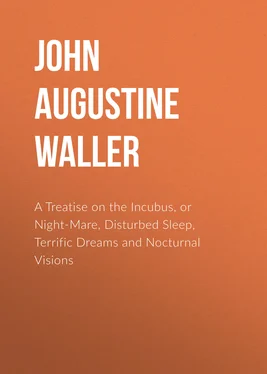John Waller - A Treatise on the Incubus, or Night-Mare, Disturbed Sleep, Terrific Dreams and Nocturnal Visions
Здесь есть возможность читать онлайн «John Waller - A Treatise on the Incubus, or Night-Mare, Disturbed Sleep, Terrific Dreams and Nocturnal Visions» — ознакомительный отрывок электронной книги совершенно бесплатно, а после прочтения отрывка купить полную версию. В некоторых случаях можно слушать аудио, скачать через торрент в формате fb2 и присутствует краткое содержание. Жанр: foreign_prose, foreign_religion, Философия, foreign_psychology, foreign_antique, на английском языке. Описание произведения, (предисловие) а так же отзывы посетителей доступны на портале библиотеки ЛибКат.
- Название:A Treatise on the Incubus, or Night-Mare, Disturbed Sleep, Terrific Dreams and Nocturnal Visions
- Автор:
- Жанр:
- Год:неизвестен
- ISBN:нет данных
- Рейтинг книги:3 / 5. Голосов: 1
-
Избранное:Добавить в избранное
- Отзывы:
-
Ваша оценка:
- 60
- 1
- 2
- 3
- 4
- 5
A Treatise on the Incubus, or Night-Mare, Disturbed Sleep, Terrific Dreams and Nocturnal Visions: краткое содержание, описание и аннотация
Предлагаем к чтению аннотацию, описание, краткое содержание или предисловие (зависит от того, что написал сам автор книги «A Treatise on the Incubus, or Night-Mare, Disturbed Sleep, Terrific Dreams and Nocturnal Visions»). Если вы не нашли необходимую информацию о книге — напишите в комментариях, мы постараемся отыскать её.
A Treatise on the Incubus, or Night-Mare, Disturbed Sleep, Terrific Dreams and Nocturnal Visions — читать онлайн ознакомительный отрывок
Ниже представлен текст книги, разбитый по страницам. Система сохранения места последней прочитанной страницы, позволяет с удобством читать онлайн бесплатно книгу «A Treatise on the Incubus, or Night-Mare, Disturbed Sleep, Terrific Dreams and Nocturnal Visions», без необходимости каждый раз заново искать на чём Вы остановились. Поставьте закладку, и сможете в любой момент перейти на страницу, на которой закончили чтение.
Интервал:
Закладка:
The late Dr. Darwin, who had an admirable talent for explaining the phenomena of animal life in general, is of opinion, that this affection is nothing more than sleeping too sound; in which situation of things the power of volition, or command over the muscles of voluntary motion, is too completely suspended; and that the efforts of the patient to recover this power, constitute the disease we call Night-Mare. In order to reconcile this hypothesis with the real state of things, he is obliged to have recourse to a method not unusual amongst theoretic philosophers, both in medicine and other sciences—that is, when the hypothesis does not exactly apply to the phenomenon to be explained by it, to twist the phenomenon itself into such a shape as will make it fit, rather than give up a favourite hypothesis. Now, in order to mould the Night-Mare into the proper form, to make this hypothesis apply to it, he asserts, first, that it only attacks persons when very sound asleep; and secondly, that there cannot exist any difficulty of breathing, since the mere suspension of volition will not produce any, the respiration going on as well asleep as awake; so that he thinks there must needs be some error in this part of the account. Any person, however, that has experienced a paroxysm of Night-Mare, will be disposed rather to give up Dr. Darwin’s hypothesis than to mistrust his own feelings as to the difficulty of breathing, which is far the most terrific and painful of any of the symptoms. The dread of suffocation, arising from the inability of inflating the lungs, is so great, that the person, who for the first time in his life is attacked by this “worst phantom of the night,” generally imagines that he has very narrowly escaped death, and that a few seconds more of the complaint would have inevitably proved fatal. This disease, although neglected by modern physicians, was well described and understood by those of the seventeenth century, as well as by the Greeks and Romans. 1 1 The learned Theophilus Bonetus observes, that this disease was unknown to Hippocrates and Galen.—Vide Polyath. Lib. ii. Cap. xxviii. De Incubo et Catalepsi . Unknown it could not be to such observers of nature, although they may not have written upon it. In the book however, ascribed to Galen, entitled “De Utilitate Respirationis,” the following short, but comprehensive notice, is to be found concerning it.— Et Ephialtes quædam Epilepsia, quæ fit in somno: fit autem ex mistione tanquam Epilepsia. Ideoque non in vigilante, sed in dormiente: ut enim, prædictum est somnus et epilepsia fiunt in eodem loco, et ex simili causâ: unde Aristoteles dicit epilepsiam esse somnum quendam: verum ephialtes longo tempore perdurans in Epilepsiam convertitur.
There are few affections more universally felt by all classes of society, yet it is seldom at present considered of sufficient consequence to require medical advice. To those nevertheless who, from sedentary habits, and depraved digestion, are the most frequent subjects of it, it is a source of great anxiety and misery, breaking in upon their repose, and filling the mind with constant alarms for more serious consequences, “making night hideous,” and rendering the couch, which is to others the sweet refuge from all the cares of life, to them an object of dread and terror. To such persons, any alleviation of their sufferings will be considered an act of philanthropy; as they are now in general only deterred from applying to the practitioners of medicine for relief, from the idea that their case is out of the reach of medicine.
It is a very well known fact, however, that this affection is by no means free from danger. I have known one instance in which a paroxysm of it certainly proved fatal, and I have heard of several others. I do not doubt indeed but that this happens oftener than is suspected, where persons have been found dead in their beds, who had retired to rest in apparent health. I do not know that any late writer has observed a fatal case of Night-Mare, but we find a circumstance recorded by Cœlius Aurelianus, who is supposed to have lived a short time before Galen, which, if true, is very remarkable; and I know no reason why it should be doubted. Yet I am aware that in the age in which we live, it is a common practice, not merely to doubt, but to contradict every fact recorded by ancient writers, which, if admitted, would militate against any received theory. Cœlius Aurelianus, however, informs us, upon the authority of Silimachus , a follower of Hippocrates, that this affection was once epidemic at Rome, and that a great number of persons in that city died of it. 2 2 Memorat denique Silimachus Hippocratis sectator, contagione quâdam, plurimos ex istâ passione, (i. e. Incubo) velut lue, apud Urbem Romam confectos.— Cœl. Aurel. lib. i. cap. iii. de Incubone.
A young man, of sober habits, about thirty years of age, by trade a carpenter, had been all his life subject to severe attacks of Night-Mare. During the paroxysm he frequently struggled violently, and vociferated loudly. Being at Norwich for some business, which detained him there several weeks, he one night retired to bed in apparent good health; whether he had eaten supper, or what he had taken previously to going to bed, or during the day, I cannot now remember. In the night, or towards morning, he was heard by some of the family in the house where he lodged to vociferate and groan as he had been accustomed to do during the paroxysms of Night-Mare; but as he was, after no great length of time, perfectly quiet, no person went to his assistance. In the morning, however, it was soon observed that he did not, as usual, make his appearance, and on some person going into his room, he was found dead, having thrown himself by his exertions and struggles out of bed, with his feet, however, still entangled among the bed-clothes. This patient, and the circumstances attending his death, were very well known to me, and I have not the least doubt that it was Night-Mare which proved fatal to him. A similar case has been related to me by a person deserving of credit, and I do not doubt but they are of more frequent occurrence than is generally supposed. It may appear surprising to some, that a person should struggle with so much violence as to throw himself out of bed, and yet not shake off the Night-Mare, since, in general, it is sufficient to call a person by his name, and he will recover. This is indeed true in common cases, and in every case it is of much more service than any exertions which the patient himself can make. I once at sea, in a paroxysm of Night-Mare, threw myself out of my cot, and it nearly cost me my life. Had any person been near to have taken hold of my hand, and have called to me, I should have been easily recovered, whilst, notwithstanding my struggles, and the violence with which I fell out of my cot, I lay nevertheless for some time partly upon a chest, and partly upon the cot, without being able to recover myself. I cannot help thinking that, but for the violent motion of the ship (as it was blowing a gale of wind), and the noise from every thing about me, that paroxysm of Night-Mare would have proved fatal. The disease had then gained very much upon me, and was at its greatest height.
Although instances of a fatal termination of this disease may be rare; it is not so, to find it degenerate into Epilepsy, of which it is frequently the forerunner, and to which, when it has become habitual, it appears to bear a great affinity. There is however a great difference in the degree of danger, between an accidental and an habitual Night-Mare, which we shall have occasion to notice hereafter.
I shall begin by describing this affection as it most commonly occurs, pointing out the various degrees and varieties of it, and the persons most subject to it. Its remote and proximate causes will be the next subject of consideration, and lastly the means necessary to be pursued for avoiding it, as well as those likely to afford immediate relief.
Читать дальшеИнтервал:
Закладка:
Похожие книги на «A Treatise on the Incubus, or Night-Mare, Disturbed Sleep, Terrific Dreams and Nocturnal Visions»
Представляем Вашему вниманию похожие книги на «A Treatise on the Incubus, or Night-Mare, Disturbed Sleep, Terrific Dreams and Nocturnal Visions» списком для выбора. Мы отобрали схожую по названию и смыслу литературу в надежде предоставить читателям больше вариантов отыскать новые, интересные, ещё непрочитанные произведения.
Обсуждение, отзывы о книге «A Treatise on the Incubus, or Night-Mare, Disturbed Sleep, Terrific Dreams and Nocturnal Visions» и просто собственные мнения читателей. Оставьте ваши комментарии, напишите, что Вы думаете о произведении, его смысле или главных героях. Укажите что конкретно понравилось, а что нет, и почему Вы так считаете.












